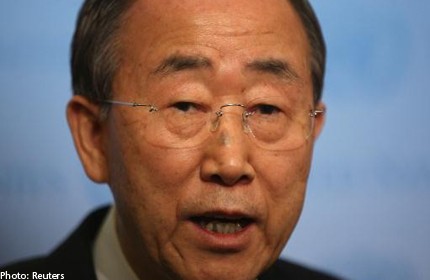Ban to present key Syria chemical report

UNITED NATIONS - UN leaders have "agonized" over a report that Secretary General Ban Ki-moon will present Monday on chemical weapons in Syria that could renew pressure on President Bashar al-Assad, officials said.
Ban has already revealed that he expects the report by a UN investigation team to the UN Security Council to give "overwhelming" confirmation that arms were used in an attack near Damascus on August 21 in which hundreds died.
But the UN team is not allowed to say who carried out the attack, which the West blames on Assad. While diplomats say the detail will give a clear pointer to who is responsible, opponents and supporters of Assad - who pleads innocence - will be looking for evidence to back their case.
A Russia-US accord on the dismantling of Syria's chemical stockpile will also weigh heavily on Security Council consultations expected to be called Monday.
Russia's Foreign Minister Sergei Lavrov on Saturday slammed what he called attempts to "retouch" the UN report. Syria's UN envoy, Bashar Jaafari, has also said his government will not accept a "politicised" report.
"Russia, the Americans, all sides, have been putting on pressure over this report," a UN official told AFP, speaking on condition of anonymity. "Ban's office has agonized over every word. The message has to be how serious this attack was but also support the Russia-US initiative."
Diplomats from various countries also confirmed approaches to Ban about the report.
The UN team, led by Swedish expert Ake Sellstrom, went to Damascus on August 18 to investigate claims that chemical weapons were used near Aleppo on March 19 and at two other sites, which have been kept secret.
They were in Damascus when the attack on opposition-held Ghouta in the suburbs was staged on August 21. The United States says 1,400 people were killed, and, backed by Britain and France, has blamed the Assad government. The team was immediately put onto the Ghouta attack and will return later to investigate the other sites.
Threats to stage a military strike on Assad targets have been thwarted by the British parliament's rejection of action, US President Barack Obama's decision to seek congressional approval, and the Russia-US accord announced Saturday seeking to dismantle Syria's chemical arms by 2014.
The UN report will influence any attempt by the UN Security Council to agree a resolution backing the Russia-US accord. Lavrov has made clear Russia will not allow any UN resolution that approves the use of force if Assad does not carry out the accord. Western nations insist there must be "consequences".
The UN report promises to be very technical with details of the missile used and possibly the trajectory of the missile, according to diplomats. It was not certain however that Sellstrom's report would give full details of the chemical used.
"They have collected a considerable amount of evidence - evidence through samples, evidence through witness interviews - and they can construct through that a fact-based narrative that can get at the key facts of what happened on August 21," a UN spokesman said on August 29 before the team left through Damascus.
The samples of blood, hair, urine, soil and other elements have been analysed at laboratories in Germany, Switzerland, Sweden and Finland, according to officials.
Alongside the report, Ban will make his own presentation which could also influence the next stages of the diplomatic debate.
"The commission had access to a very large amount of evidence," said a UN Security Council diplomat, who spoke on condition of anonymity. "Any reader of the report will be able to guess who carried it out."
"That is not so important now," added a second diplomat. "What is important is the negotiations for a council resolution on the Geneva accord."